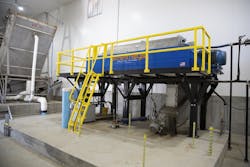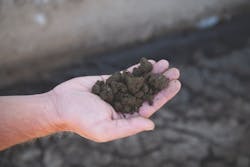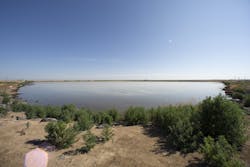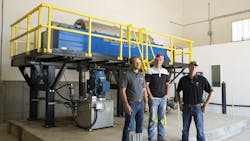The Future of Manure Management: Dewatering & Solids Separation
About the author:
Josh Gable is the director of sales and a manure specialist for Centrisys/CNP. Gable can be reached at [email protected]
Dairy farmers and livestock producers manage more than 1 billion tons of animal manure annually in the U.S. With many dairy operations in the U.S. consolidating the number of cows concentrated on a single farm, proper handling of waste has not only become critically important, but highly scrutinized by regulators, residents and environmental groups.
The U.S. EPA concludes that a dairy farm with 2,000 cows generates more than 240,000 pounds of manure daily or nearly 90 million pounds per year. The U.S. Department of Agriculture (USDA) estimates that manure from just 200 milking cows produces as much nitrogen as sewage from a community of 5,000 to 10,000 people.
Amid tighter regulations and an inherent desire to protect communities, dairy farm operators have found value in incorporating decanter centrifuges into the manure management and solid separation process.
The Ideal Decanter Centrifuge for Dairy Operations
Established more than 30 years ago, Centrisys Corp. is based in Kenosha, Wisconsin, and recognized as one of a few companies in the world focused solely on centrifuge technology.
In 2005, Centrisys placed a centrifuge system for the first time in a dairy application. Michael Kopper is president and CEO of Centrisys and he said a lot has been learned about the system since then.
“What we placed on dairy farms in 2005 was similar to what we were using in municipal applications,” Kopper said. “Over the years, through partnerships with our dairy customers and trusted dairy operations experts like Dairy Specialists and Standley & Co., we learned about the complexity of dairy manure.”
Compared to municipal waste, manure is much more aggressive on a centrifuge. Centrisys learned how to optimize its centrifuge for dairy manure and address water quality and phosphorus emission to maximize performance. The result was the DT Series Decanter Centrifuge, which was specifically developed to handle manure. When compared with conventional equipment such as slope screens, drum screens, roll presses and screw presses it:
- Separates up to three times the total solids without the addition of coagulants and polymers;
- Achieves phosphorus removal of 50% or more without chemical additions, and 75% removal with chemical additions;
- Lowers owning and operating costs due to ease of operation and maintenance;
- Reduces storage lagoon dredging frequency; and
- Allows for utilization of recovered solids as bedding material or soil amendments.
Bettencourt Dairy Installs Decanter Centrifuge
Wendell, Idaho-based Bettencourt Dairy identified Centrisys’ CS26-4HCDT Series Decanter Centrifuge system as the optimal way to manage manure and has experienced strong results and value from incorporating the system since installation in 2018.
“We knew the Centrisys decanter centrifuge was designed to handle manure, and the only piece of equipment that was going to be efficient enough to extract the solids, nitrates, and phosphates out of the water,” said Don Brand, manager of equipment and buildings with Bettencourt Dairy Operations.
Bettencourt Dairy houses more than 13,000 dairy cows that produce 1,800 gallons of manure per cow, per day, plus parlor water. Before the centrifuge installation, slope screens were used to remove coarse material and farm operations personnel had to manage the dredging of the 200-acre waste lagoon once a year. The team was tasked with processing and addressing a nutrient management plan when they added cross-fence and vac trucks to remove the manure from the barns.
“We knew the Centrisys centrifuge system would be the only equipment that would grow and expand with our operation,” Brand said. “Without added chemicals, it removes most of the solids, typically leaving less than 1% total suspended solids in the manure that previously went into the lagoons.”
The farm now only has to dredge its waste lagoon once every two to three years. Instead of dredging a few feet from the lagoon, the Centrisys centrifuge minimizes solids to only a few inches. Residual manure solids make up 25% of total solids and are resold as compost fertilizer.
“Over time, the dual setup of having a screen up front and a centrifuge downstream has made sense for Bettencourt Dairy from a cost of ownership and equipment lifecycle basis,” Kopper said. “When we put a screen up front, associated maintenance costs drop significantly, and this is widely known to address one of the biggest pain points on a dairy farm.”
When asked about the impact the centrifuge system has made on the dairy’s business, Brand said it was the first manure processing equipment the company had installed that worked immediately and as described.
Added Value Through Partnerships
Aligning with dairy operation experts like Dairy Specialists, parlor and dairy design consultants, and Standley & Co., maintenance specialists for manure management systems, have been key factors for Centrisys in the integration of centrifuges within dairy applications.
“We have partnered with Dairy Specialists for nearly 15 years, and since that time, we’ve run 400-gallon per minute for 365 days per year since the first installation,” Kopper said. “With routine maintenance, we are proud to say that the unit is still running today.”
In partnership with Diary Specialists and Standley & Co., the team’s extensive knowledge and collaborative experience in the industry has allowed Centrisys to continuously improve on its initial system first used on a dairy farm.
“A lot of background work goes into making the best system, and from day one, we knew we picked the right partner,” said Scott Brown, centrifuge sales manager with Dairy Specialists. “Response from Centrisys representatives in engineering, production, to process consulting all show their dedication and commitment to supporting the critical needs of dairies.”
The operation would not work as effectively for farms like Bettencourt Dairy without the support of locally-based service provider Standley & Co.. Daily and weekly service checks, along with bi-monthly water material sample analysis, validate the efficiency of the system.
“Dairy farmers focus on producing milk, but they also need to manage their manure,” Kopper said. “Having a local asset in the market to help with the maintenance is essential and provides peace of mind that the centrifuge system is processing exactly the way it should.”



